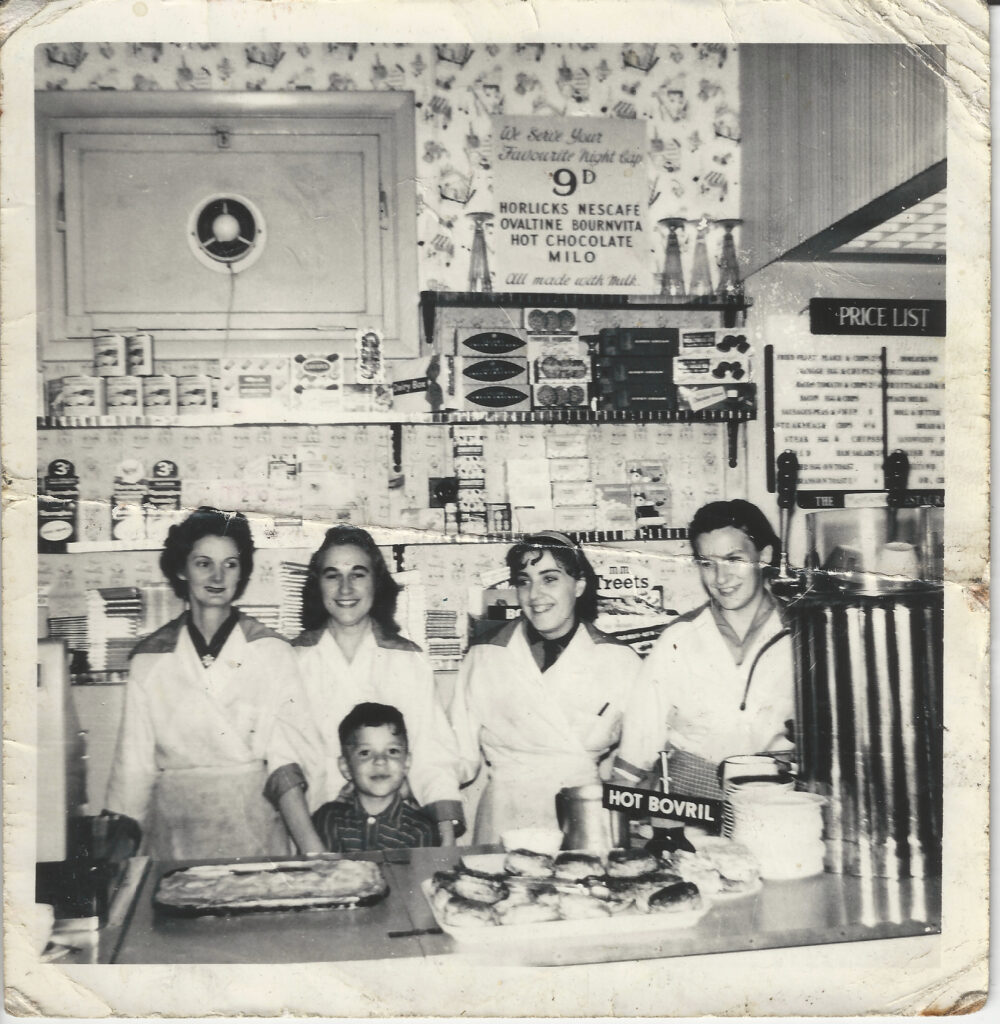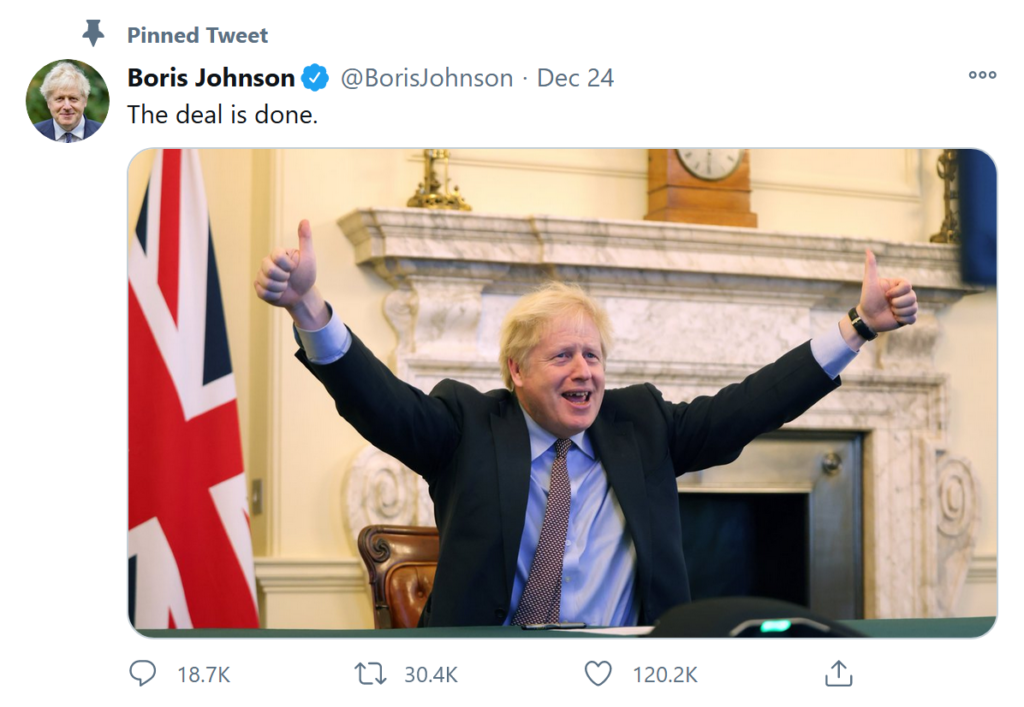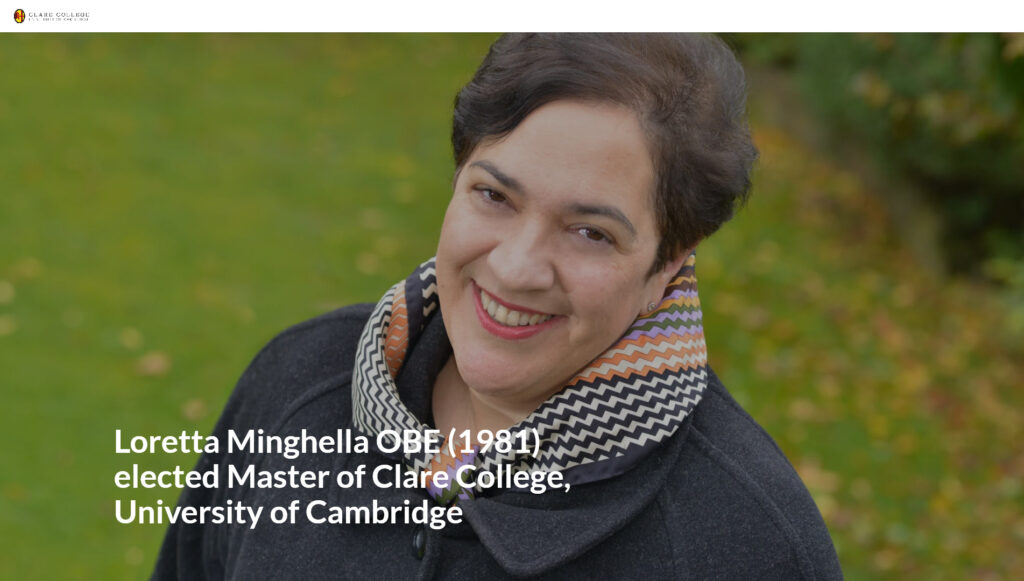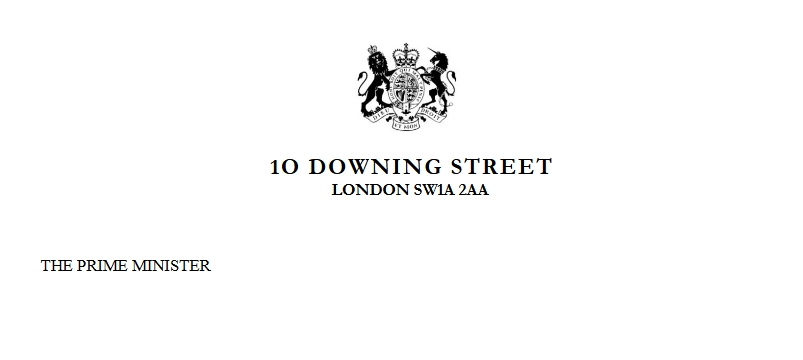I was going to write a reflection on this momentous year. Instead, I want to tell you about Muriel. And what’s curious is I don’t know why.
She wasn’t anybody famous, and her life wasn’t particularly notable, and the number of people on the planet who knew and cared about her is probably down to a handful.
But, after this strange and horrible year – including a brush with the Covid brink – I suppose I’ve been counting my blessings and thinking about the good people in my life, and those who have formed me.
Muriel Winter worked for our parents in our cafe/restaurant/guest house/ice cream factory/ice cream parlour in the High Street in Ryde, Isle of Wight. We called it “the shop”, but it came to comprise quite a large site, both on the High Street and backing onto George Street by the public library. The frontage was bang in the centre of town, opposite Woolworths, and in its heyday it was the place in town. Our family, dominated by the women – our gran (“Mrs A”) and our mum (“Mrs M”) – were larger than life characters in Ryde, and Muriel was their equally-feisty lieutenant. She was de facto in charge when the family weren’t around, strict and forthright and eternally loyal. She saw herself as family, and, by the time I was born in 1966, she already was. When our parents were away, she was a kind of Mum. She would not hesitate to reprimand, and her authority to do so went unquestioned.
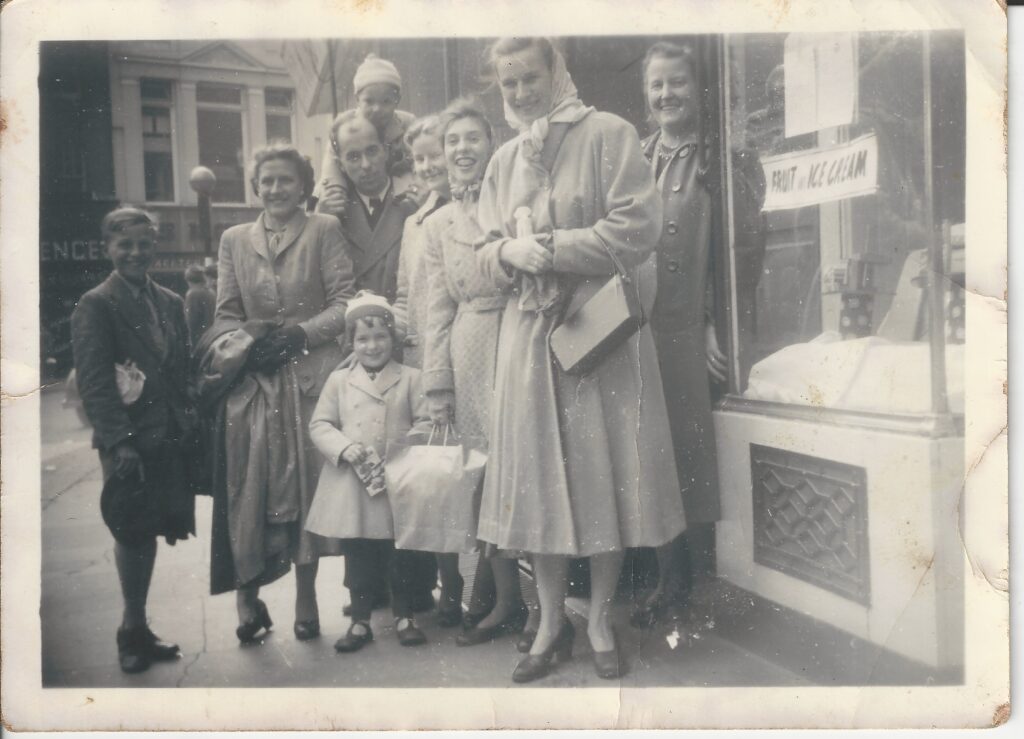
She had started working for us, like many local Ryde girls, at the age of 14, when the business was just a few tables, like something out of Brief Encounter. The business grew rapidly. She was there for its glory days in the 50s and 60s, when it opened for breakfast, lunch and dinner seven days a week, with wedding receptions and events upstairs in the two large function rooms, and a thriving, if somewhat grandly-named, guest house business above that: the Mayfayre Hotel.
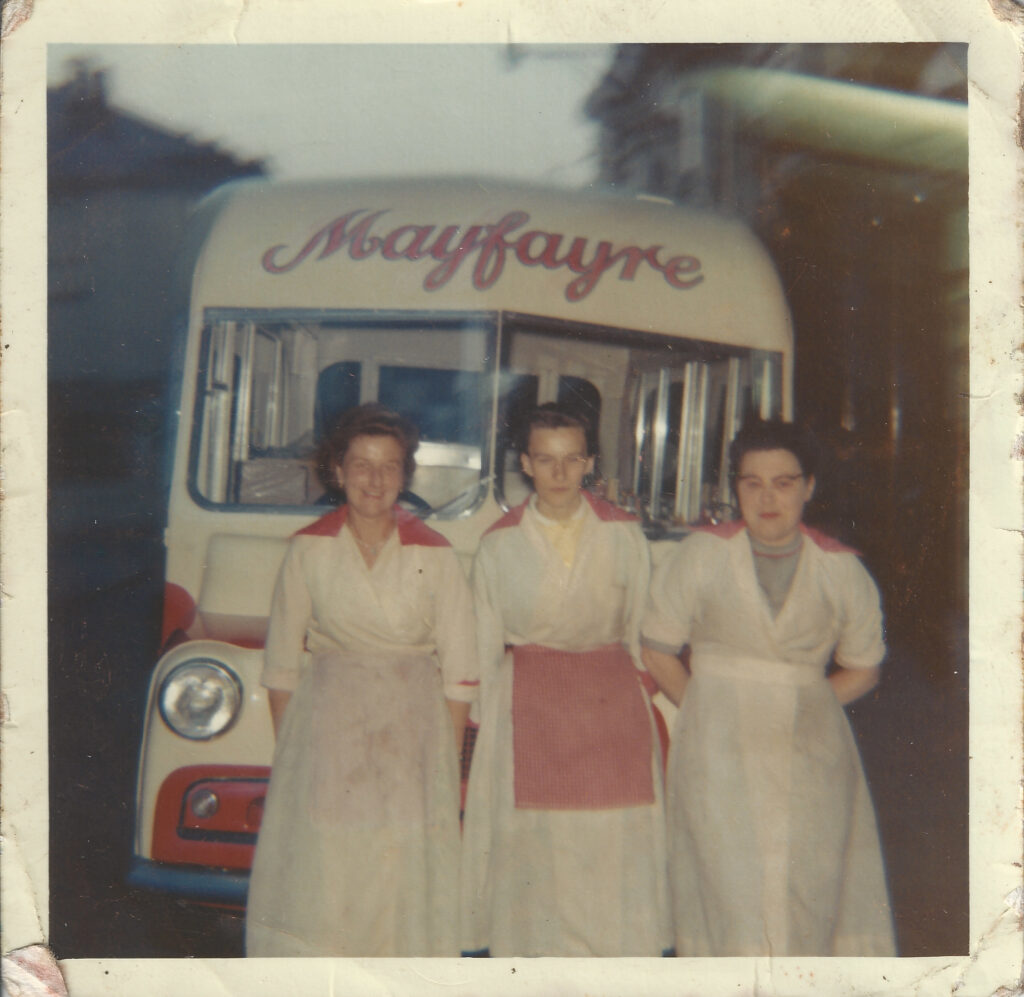
She lived alone in a faintly depressing council flat on the edge of Ryde, near the High School. She set out large jigsaws on her dining table. She had a black and white telly long after colour came in. She loved Coronation Street. She had no phone (until much later in life, when my sister arranged it, and kindly paid the bills). I remember the flat smelling strange. I remember the hard-edged, rectangular soullessness of it. Tiny plastic dogs on the window sill, which I had once, when I was very little, hoped she would give me. Those dogs remained until her last days.
On my final visit to her flat in 2013, I saw a book open in the kitchen. She was keeping – out of necessity, I’m sure – a note of her milk deliveries, and a running total of how much she owed the milkman. Literally minding the pennies.
In my youth, when we closed the shop for Christmas, she would move to our house, and spend Christmas with us. “Mere” coming was part of Christmas. When we were young, she would bring comic annuals. Remember them? My eldest sister recalls Mere giving her Jack and Jill, and Bunty. My brother, apparently, had Dandy. In my day, it was Whizzer and Chips.
In the 1980s she became less fit and we used to give her a lift home after work. It wasn’t really on our way, and my Dad, whose impatience was aggravated by her slowness, would barely stop the car long enough for her to go through the strangely elaborate rigmarole of undoing the seatbelt and hauling herself out. One evening she was slower than ever, and it became apparent that she had something to say. She took a breath then looked away as she said it: “My little girl would have been 15 today.”
With that, she shuffled towards her flat. I had not known before that day that she had been married, to an Italian guy, whom my Dad characterised as a rogue. She had been pregnant and it was a shotgun wedding. The child was stillborn, and so was the marriage. I never got the sense that Muriel missed the guy, but she was clearly mourning that little girl. I remember her saying the same thing three years later, with the same tight grief in her bearing and in her voice. “My little girl would have been 18 today.”
So we were her family. She spent all her working days, and her Christmases, with us. When the shop finally closed in the late 1980s, she went to register for benefits, and was asked to list her previous employers. She wrote “Minghellas”. The form was returned: “You must list all of your previous employers, with dates”. She said, “I’ve only ever worked for them. And since I was a girl.”
She took her adopted family duties seriously. She followed our news like a blood relation would. She wrote cards to us all, wherever we were in the world, and made sure they were posted in good time. They would typically arrive 5-7 days in advance of a birthday. All our children were remembered too, without fail. My sister even received a birthday card from Muriel after her death; she’d had it ready and left it with her brother to send. Her scratchy scrawl was instantly recognisable in the post, and her reliability was an amusing comfort. On the back she would always write her home address, and leave off the first two letters (“PO”) from the postcode, because she understood those to mean “Post Office” and therefore to be superfluous. (In fact they stood for Portsmouth, which Isle of Wight residents should not, in my view, tolerate! I don’t think we ever disabused her.)
In later Christmases, even when the family had grown great in number, she still had a present for everybody, even in her flat-broke, penny-minding, pension days. Reliable presents: socks, hankies, shower gel, slippers. Clothes for the kids which, if not exactly stylish, were practical and always, somehow, the right size, even if she hadn’t seen the recipient child in ages.
She was meticulous in the receiving, too. At the last Christmas we had together, just before she died, I recall seeing her in an armchair surrounded by discarded wrapping paper and a mountain of gifts and shooting me a stern look: “Dominic, Have I had my present from you?” She had not, and, despite the mountain, there was no danger of her forgetting.
So what? So what about this woman in a lonely flat on the Isle of Wight? The answer is I don’t know. We live in a time when everything, and everyone, has to be remarkable, right? To justify my time writing this, and your time reading it, there has to be something exceptional about her. I’m not sure there is anything remarkable about Muriel. But here I am, and here we are.
After she died in 2014, my siblings and I wrote down memories of her. Her false teeth, and how, when you phoned her, there would be a delay between answering and the start of the conversation, while she put her teeth in. How, if you knocked into her, she would be absolutely affronted, and declare, “I shall have a bruise there later”. (She did bruise easily.) How, if you asked her when the bus went to Newport, she would answer by looking at the clock: “I think there’s one at five- and twenty to.” How we each treasured memories of being taken on trips on her days off – something we never did with our actual parents. She took me on my first trips to Blackgang Chine and Alum Bay. Possibly my only childhood trips to those Island staples.
Our memories were mostly just snapshots, trivial and fond. But I learned another thing I had not previously known: her mother died young and Muriel had to bring up her brother. She may have bruised easily, but she never mentioned her family struggles. Only those anguished anniversaries leaked out.
That last Christmas, it fell to me to drop her home to her miserable flat. She did that thing of delaying her exit from the car. She said, “You’re the family I never had.” I don’t know what I said. I had preoccupations of my own. I’m sure I said something perfectly nice. But I don’t think I said what I should have said: “We’re the family you did have, Mere. And you are our family, and we love you.”
Oh. I see. That’s why I’m writing this. If 2020’s rumbling, any-moment possibility of demise teaches us anything, it must be to take those moments; to embrace those opportunities; to say the right thing; to express the gratitude and the love. For our families, our adopted families, and our friends. They are remarkable, because they form and define us, and that is enough. Not just enough. It’s everything, actually. And there is no time like now, while there’s oxygen in the lungs, to say it.
Come March, our Muriel, our Mere, would have been 84.
RIP Muriel Winter
4.4.1937 – 12.3.2014
